Exploring Experiential Learning in Complex Project Management Context
VerifiedAdded on 2023/06/09
|7
|1178
|72
Essay
AI Summary
This essay discusses the concept of beneficial learning from Terry Cooke-Davies' book 'Aspects of Complexity,' focusing on chapter 7, which investigates experiential learning. It explores the idea that not all experiences lead to beneficial learning, emphasizing the learner's ability to interpret situations. The essay examines experiential learning in complex projects, highlighting John Dewey's work on the importance of experience and meta-competencies. It argues that while experiential learning is a common characteristic of project management, its effectiveness depends on the project manager's self-awareness and reflection. The essay concludes that a combination of education and experience is crucial for developing capable project managers, emphasizing the need to extract useful learning from specific experiences for professional development. Desklib provides access to similar solved assignments and study resources.
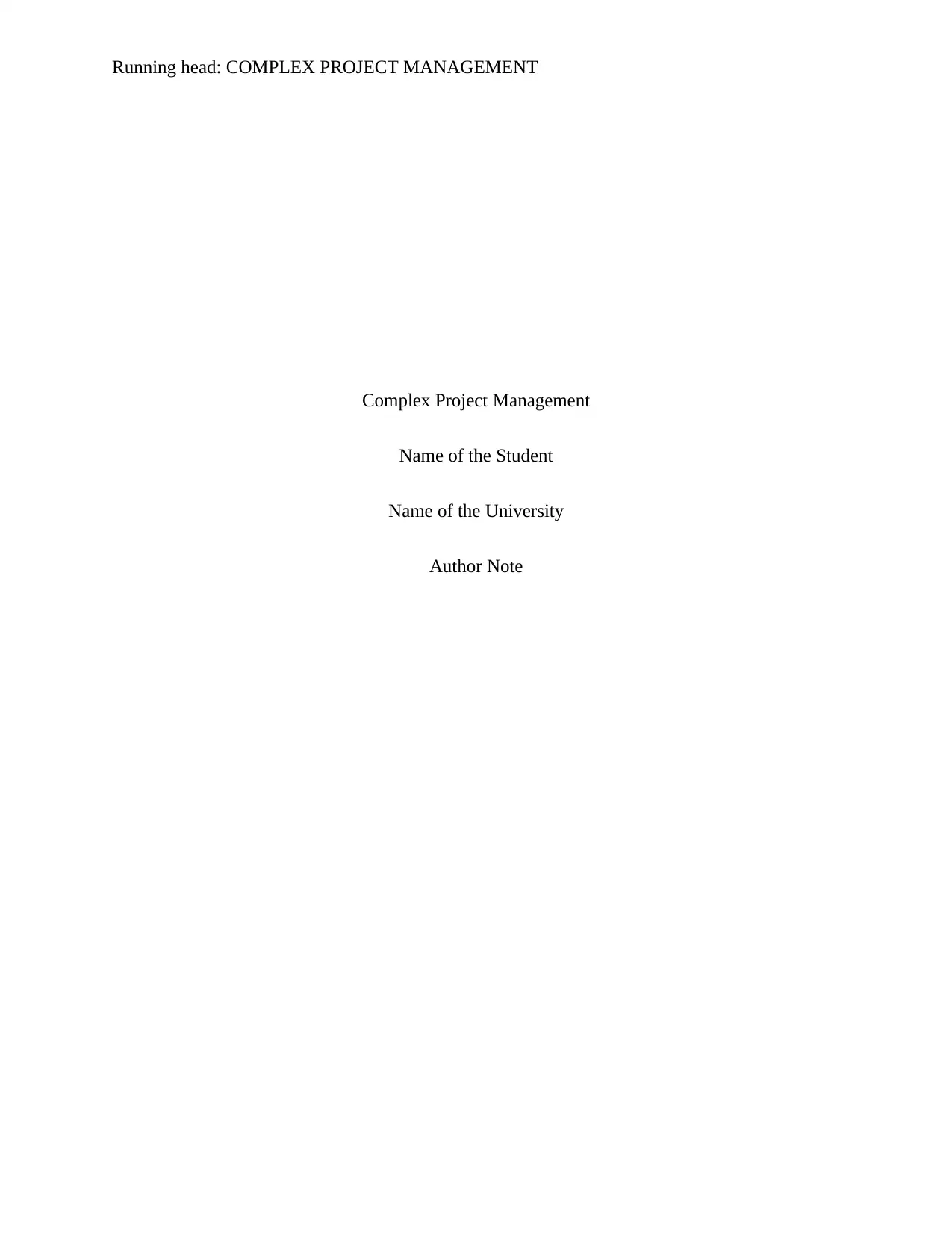
Running head: COMPLEX PROJECT MANAGEMENT
Complex Project Management
Name of the Student
Name of the University
Author Note
Complex Project Management
Name of the Student
Name of the University
Author Note
Paraphrase This Document
Need a fresh take? Get an instant paraphrase of this document with our AI Paraphraser
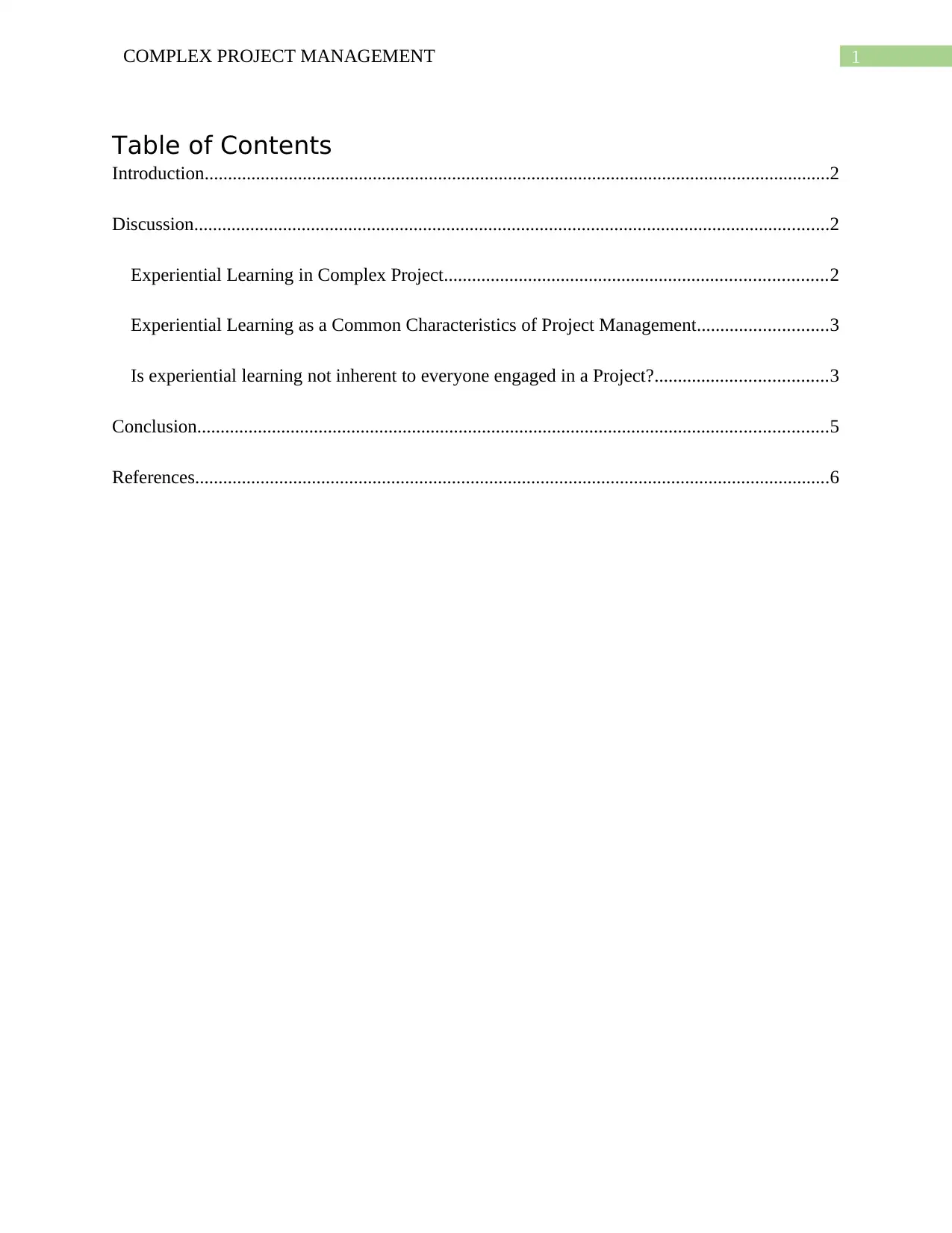
1COMPLEX PROJECT MANAGEMENT
Table of Contents
Introduction......................................................................................................................................2
Discussion........................................................................................................................................2
Experiential Learning in Complex Project..................................................................................2
Experiential Learning as a Common Characteristics of Project Management............................3
Is experiential learning not inherent to everyone engaged in a Project?.....................................3
Conclusion.......................................................................................................................................5
References........................................................................................................................................6
Table of Contents
Introduction......................................................................................................................................2
Discussion........................................................................................................................................2
Experiential Learning in Complex Project..................................................................................2
Experiential Learning as a Common Characteristics of Project Management............................3
Is experiential learning not inherent to everyone engaged in a Project?.....................................3
Conclusion.......................................................................................................................................5
References........................................................................................................................................6
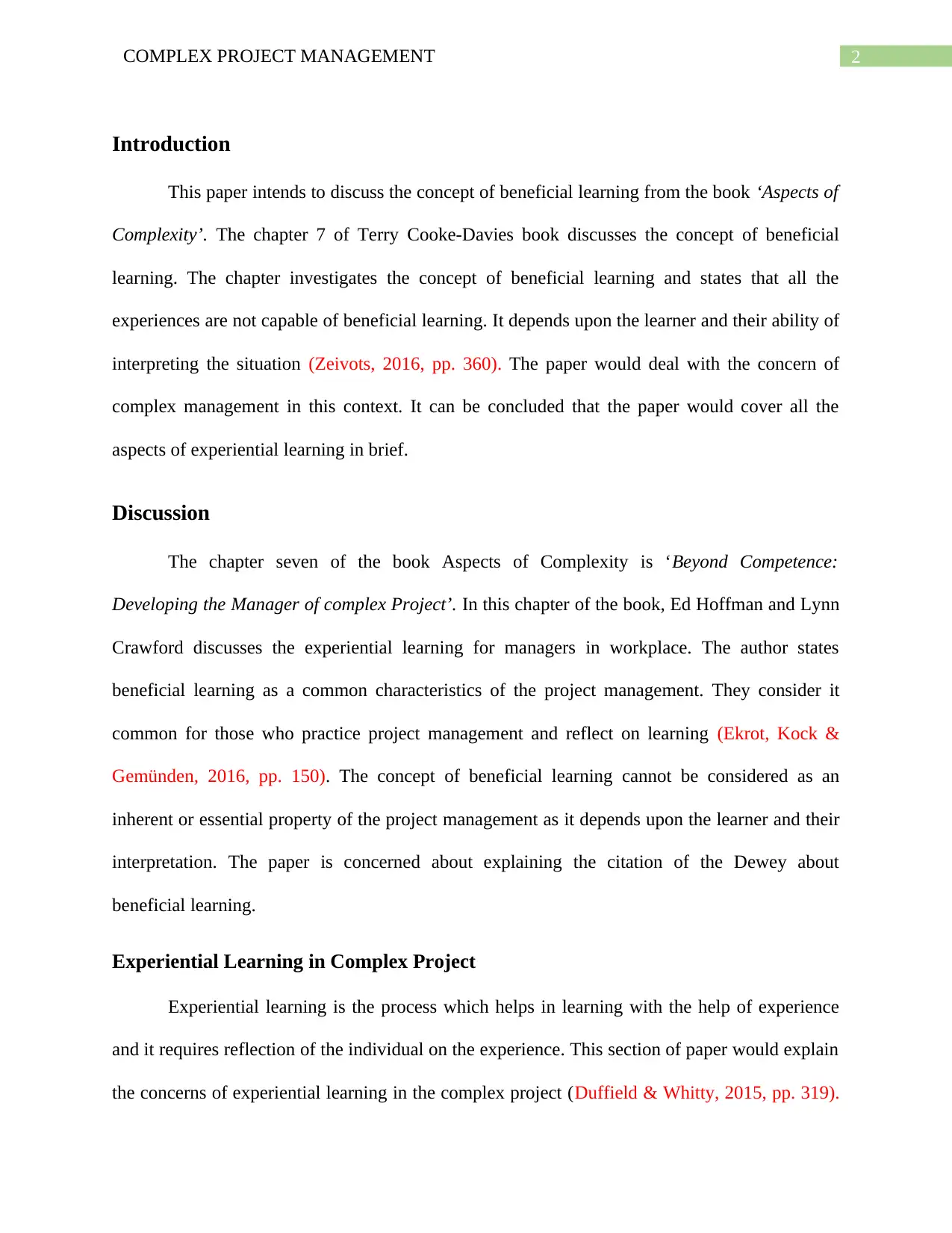
2COMPLEX PROJECT MANAGEMENT
Introduction
This paper intends to discuss the concept of beneficial learning from the book ‘Aspects of
Complexity’. The chapter 7 of Terry Cooke-Davies book discusses the concept of beneficial
learning. The chapter investigates the concept of beneficial learning and states that all the
experiences are not capable of beneficial learning. It depends upon the learner and their ability of
interpreting the situation (Zeivots, 2016, pp. 360). The paper would deal with the concern of
complex management in this context. It can be concluded that the paper would cover all the
aspects of experiential learning in brief.
Discussion
The chapter seven of the book Aspects of Complexity is ‘Beyond Competence:
Developing the Manager of complex Project’. In this chapter of the book, Ed Hoffman and Lynn
Crawford discusses the experiential learning for managers in workplace. The author states
beneficial learning as a common characteristics of the project management. They consider it
common for those who practice project management and reflect on learning (Ekrot, Kock &
Gemünden, 2016, pp. 150). The concept of beneficial learning cannot be considered as an
inherent or essential property of the project management as it depends upon the learner and their
interpretation. The paper is concerned about explaining the citation of the Dewey about
beneficial learning.
Experiential Learning in Complex Project
Experiential learning is the process which helps in learning with the help of experience
and it requires reflection of the individual on the experience. This section of paper would explain
the concerns of experiential learning in the complex project (Duffield & Whitty, 2015, pp. 319).
Introduction
This paper intends to discuss the concept of beneficial learning from the book ‘Aspects of
Complexity’. The chapter 7 of Terry Cooke-Davies book discusses the concept of beneficial
learning. The chapter investigates the concept of beneficial learning and states that all the
experiences are not capable of beneficial learning. It depends upon the learner and their ability of
interpreting the situation (Zeivots, 2016, pp. 360). The paper would deal with the concern of
complex management in this context. It can be concluded that the paper would cover all the
aspects of experiential learning in brief.
Discussion
The chapter seven of the book Aspects of Complexity is ‘Beyond Competence:
Developing the Manager of complex Project’. In this chapter of the book, Ed Hoffman and Lynn
Crawford discusses the experiential learning for managers in workplace. The author states
beneficial learning as a common characteristics of the project management. They consider it
common for those who practice project management and reflect on learning (Ekrot, Kock &
Gemünden, 2016, pp. 150). The concept of beneficial learning cannot be considered as an
inherent or essential property of the project management as it depends upon the learner and their
interpretation. The paper is concerned about explaining the citation of the Dewey about
beneficial learning.
Experiential Learning in Complex Project
Experiential learning is the process which helps in learning with the help of experience
and it requires reflection of the individual on the experience. This section of paper would explain
the concerns of experiential learning in the complex project (Duffield & Whitty, 2015, pp. 319).
⊘ This is a preview!⊘
Do you want full access?
Subscribe today to unlock all pages.

Trusted by 1+ million students worldwide
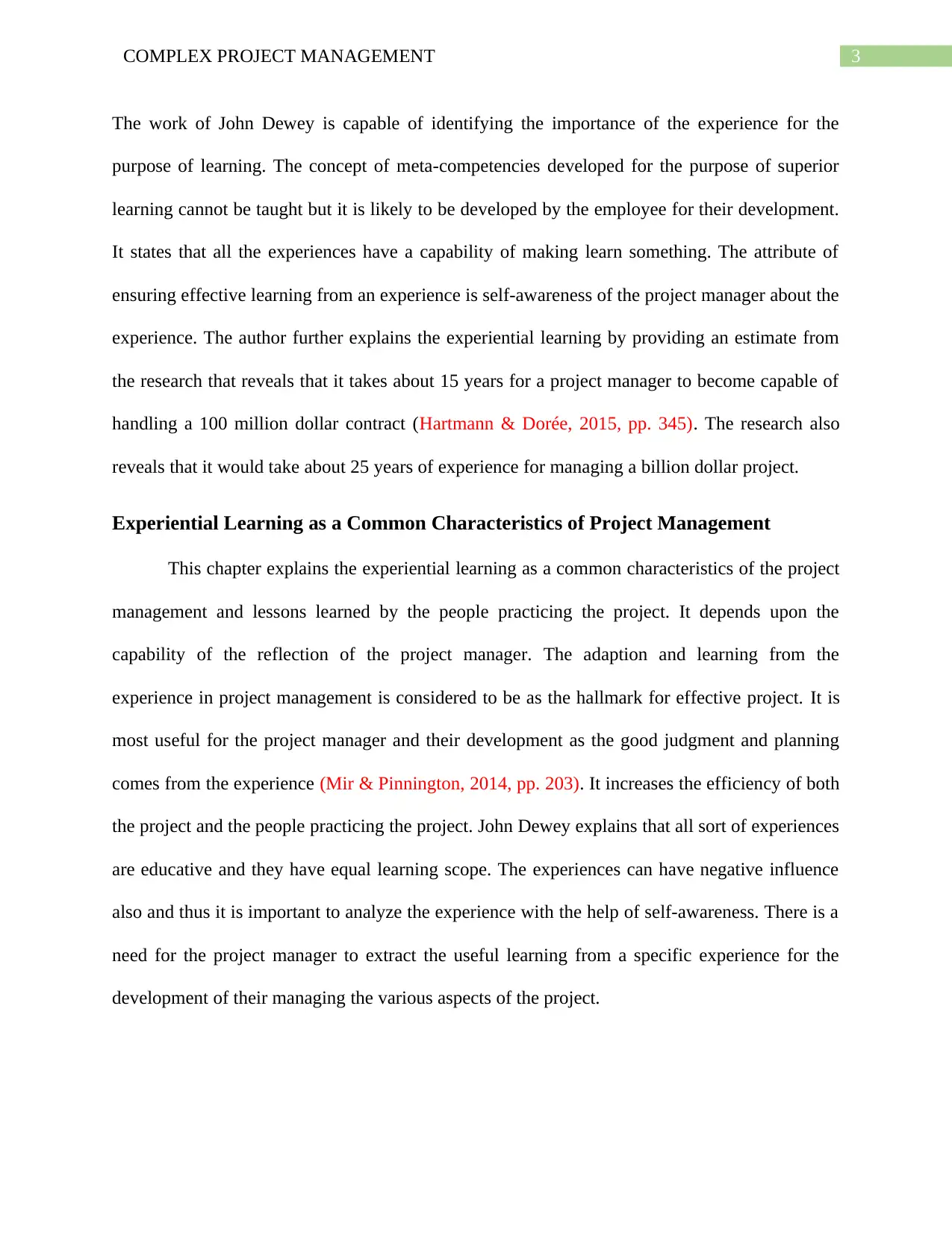
3COMPLEX PROJECT MANAGEMENT
The work of John Dewey is capable of identifying the importance of the experience for the
purpose of learning. The concept of meta-competencies developed for the purpose of superior
learning cannot be taught but it is likely to be developed by the employee for their development.
It states that all the experiences have a capability of making learn something. The attribute of
ensuring effective learning from an experience is self-awareness of the project manager about the
experience. The author further explains the experiential learning by providing an estimate from
the research that reveals that it takes about 15 years for a project manager to become capable of
handling a 100 million dollar contract (Hartmann & Dorée, 2015, pp. 345). The research also
reveals that it would take about 25 years of experience for managing a billion dollar project.
Experiential Learning as a Common Characteristics of Project Management
This chapter explains the experiential learning as a common characteristics of the project
management and lessons learned by the people practicing the project. It depends upon the
capability of the reflection of the project manager. The adaption and learning from the
experience in project management is considered to be as the hallmark for effective project. It is
most useful for the project manager and their development as the good judgment and planning
comes from the experience (Mir & Pinnington, 2014, pp. 203). It increases the efficiency of both
the project and the people practicing the project. John Dewey explains that all sort of experiences
are educative and they have equal learning scope. The experiences can have negative influence
also and thus it is important to analyze the experience with the help of self-awareness. There is a
need for the project manager to extract the useful learning from a specific experience for the
development of their managing the various aspects of the project.
The work of John Dewey is capable of identifying the importance of the experience for the
purpose of learning. The concept of meta-competencies developed for the purpose of superior
learning cannot be taught but it is likely to be developed by the employee for their development.
It states that all the experiences have a capability of making learn something. The attribute of
ensuring effective learning from an experience is self-awareness of the project manager about the
experience. The author further explains the experiential learning by providing an estimate from
the research that reveals that it takes about 15 years for a project manager to become capable of
handling a 100 million dollar contract (Hartmann & Dorée, 2015, pp. 345). The research also
reveals that it would take about 25 years of experience for managing a billion dollar project.
Experiential Learning as a Common Characteristics of Project Management
This chapter explains the experiential learning as a common characteristics of the project
management and lessons learned by the people practicing the project. It depends upon the
capability of the reflection of the project manager. The adaption and learning from the
experience in project management is considered to be as the hallmark for effective project. It is
most useful for the project manager and their development as the good judgment and planning
comes from the experience (Mir & Pinnington, 2014, pp. 203). It increases the efficiency of both
the project and the people practicing the project. John Dewey explains that all sort of experiences
are educative and they have equal learning scope. The experiences can have negative influence
also and thus it is important to analyze the experience with the help of self-awareness. There is a
need for the project manager to extract the useful learning from a specific experience for the
development of their managing the various aspects of the project.
Paraphrase This Document
Need a fresh take? Get an instant paraphrase of this document with our AI Paraphraser
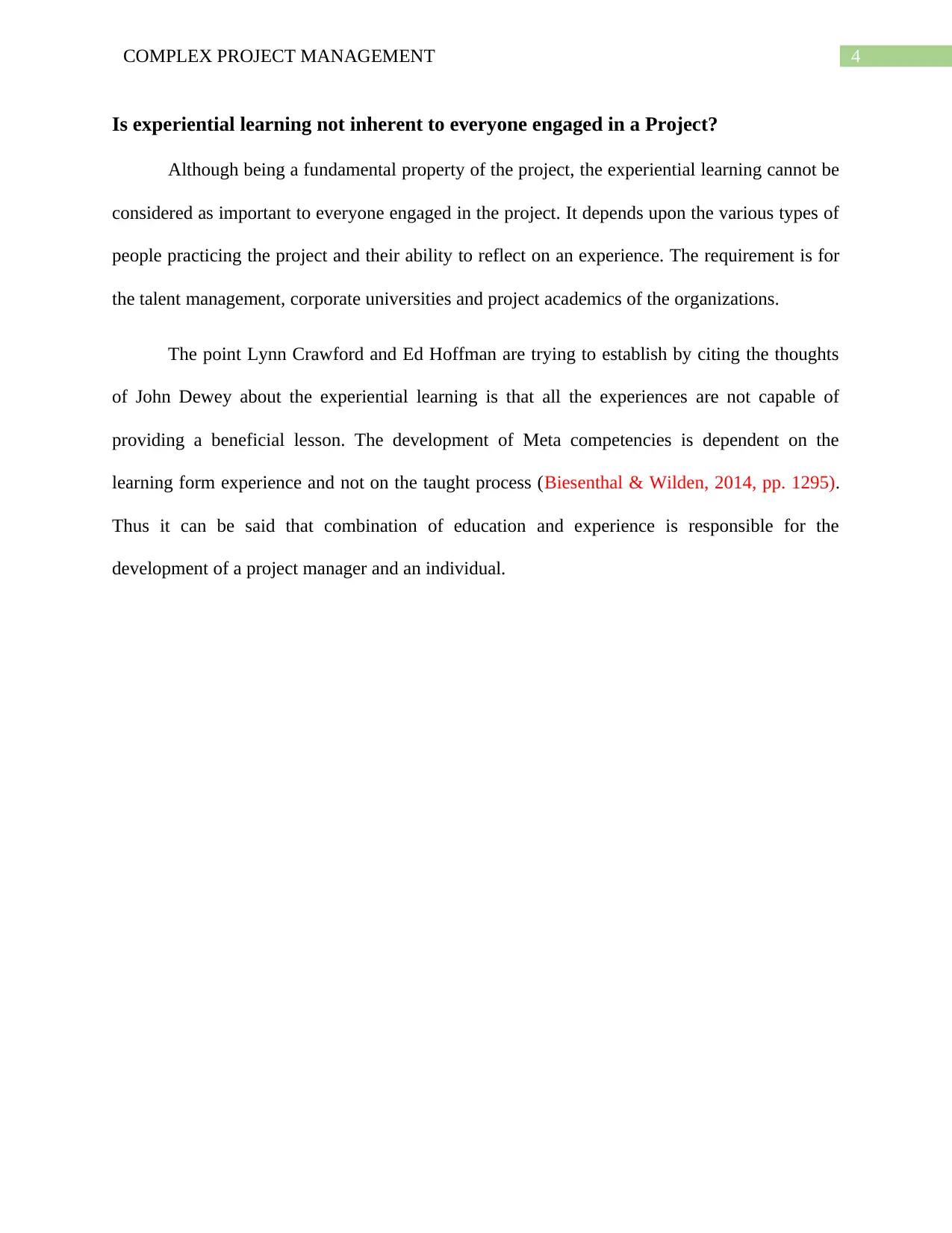
4COMPLEX PROJECT MANAGEMENT
Is experiential learning not inherent to everyone engaged in a Project?
Although being a fundamental property of the project, the experiential learning cannot be
considered as important to everyone engaged in the project. It depends upon the various types of
people practicing the project and their ability to reflect on an experience. The requirement is for
the talent management, corporate universities and project academics of the organizations.
The point Lynn Crawford and Ed Hoffman are trying to establish by citing the thoughts
of John Dewey about the experiential learning is that all the experiences are not capable of
providing a beneficial lesson. The development of Meta competencies is dependent on the
learning form experience and not on the taught process (Biesenthal & Wilden, 2014, pp. 1295).
Thus it can be said that combination of education and experience is responsible for the
development of a project manager and an individual.
Is experiential learning not inherent to everyone engaged in a Project?
Although being a fundamental property of the project, the experiential learning cannot be
considered as important to everyone engaged in the project. It depends upon the various types of
people practicing the project and their ability to reflect on an experience. The requirement is for
the talent management, corporate universities and project academics of the organizations.
The point Lynn Crawford and Ed Hoffman are trying to establish by citing the thoughts
of John Dewey about the experiential learning is that all the experiences are not capable of
providing a beneficial lesson. The development of Meta competencies is dependent on the
learning form experience and not on the taught process (Biesenthal & Wilden, 2014, pp. 1295).
Thus it can be said that combination of education and experience is responsible for the
development of a project manager and an individual.
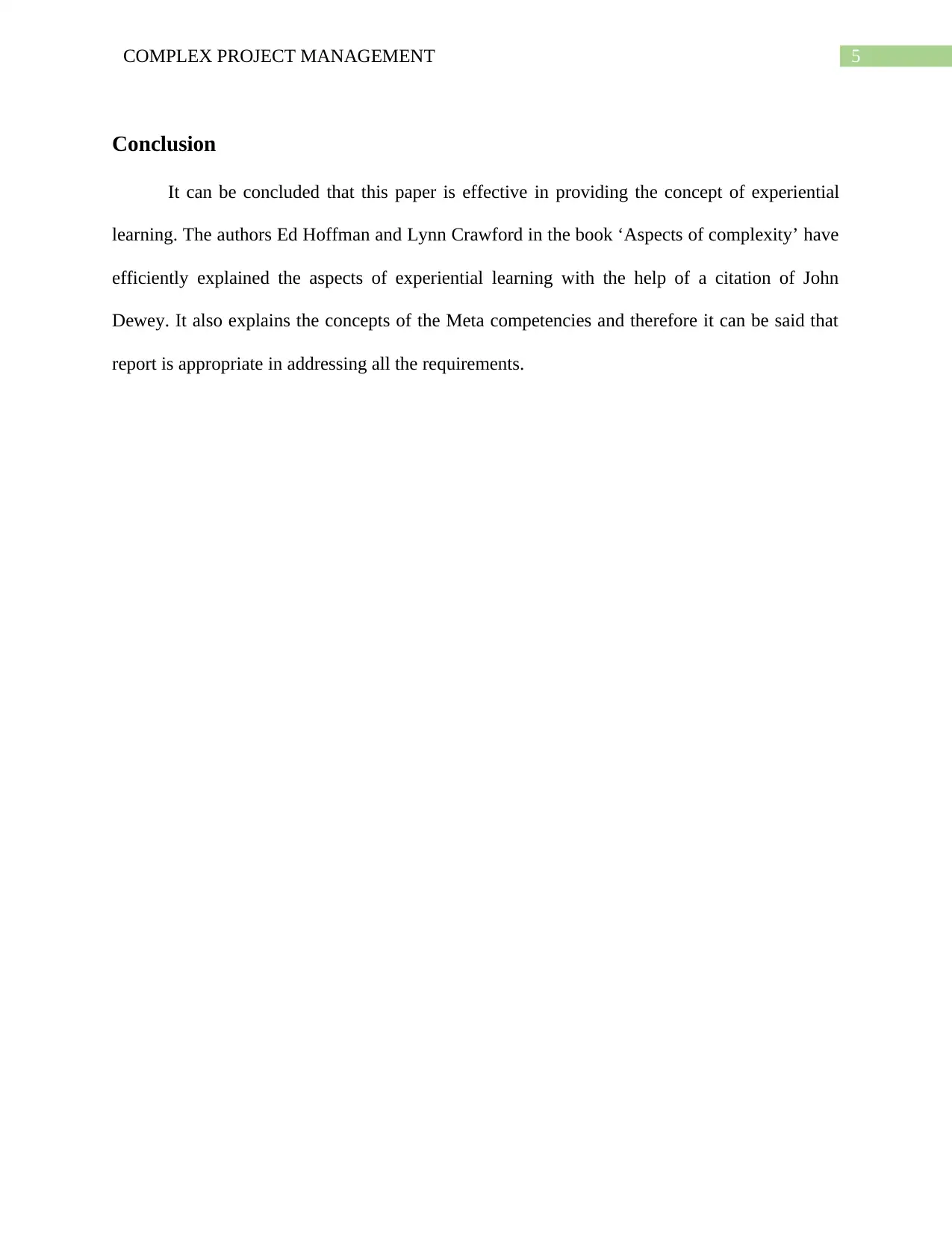
5COMPLEX PROJECT MANAGEMENT
Conclusion
It can be concluded that this paper is effective in providing the concept of experiential
learning. The authors Ed Hoffman and Lynn Crawford in the book ‘Aspects of complexity’ have
efficiently explained the aspects of experiential learning with the help of a citation of John
Dewey. It also explains the concepts of the Meta competencies and therefore it can be said that
report is appropriate in addressing all the requirements.
Conclusion
It can be concluded that this paper is effective in providing the concept of experiential
learning. The authors Ed Hoffman and Lynn Crawford in the book ‘Aspects of complexity’ have
efficiently explained the aspects of experiential learning with the help of a citation of John
Dewey. It also explains the concepts of the Meta competencies and therefore it can be said that
report is appropriate in addressing all the requirements.
⊘ This is a preview!⊘
Do you want full access?
Subscribe today to unlock all pages.

Trusted by 1+ million students worldwide
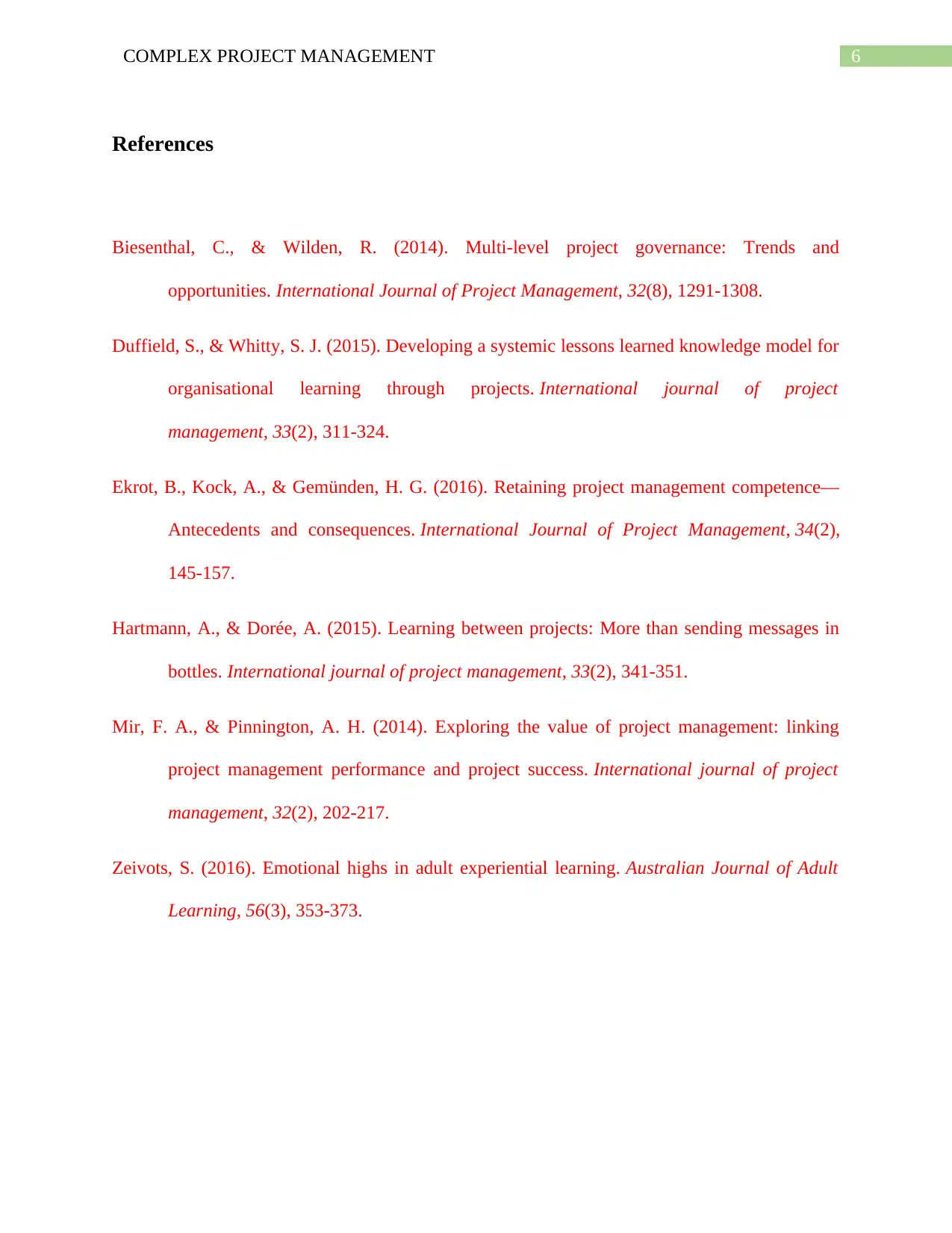
6COMPLEX PROJECT MANAGEMENT
References
Biesenthal, C., & Wilden, R. (2014). Multi-level project governance: Trends and
opportunities. International Journal of Project Management, 32(8), 1291-1308.
Duffield, S., & Whitty, S. J. (2015). Developing a systemic lessons learned knowledge model for
organisational learning through projects. International journal of project
management, 33(2), 311-324.
Ekrot, B., Kock, A., & Gemünden, H. G. (2016). Retaining project management competence—
Antecedents and consequences. International Journal of Project Management, 34(2),
145-157.
Hartmann, A., & Dorée, A. (2015). Learning between projects: More than sending messages in
bottles. International journal of project management, 33(2), 341-351.
Mir, F. A., & Pinnington, A. H. (2014). Exploring the value of project management: linking
project management performance and project success. International journal of project
management, 32(2), 202-217.
Zeivots, S. (2016). Emotional highs in adult experiential learning. Australian Journal of Adult
Learning, 56(3), 353-373.
References
Biesenthal, C., & Wilden, R. (2014). Multi-level project governance: Trends and
opportunities. International Journal of Project Management, 32(8), 1291-1308.
Duffield, S., & Whitty, S. J. (2015). Developing a systemic lessons learned knowledge model for
organisational learning through projects. International journal of project
management, 33(2), 311-324.
Ekrot, B., Kock, A., & Gemünden, H. G. (2016). Retaining project management competence—
Antecedents and consequences. International Journal of Project Management, 34(2),
145-157.
Hartmann, A., & Dorée, A. (2015). Learning between projects: More than sending messages in
bottles. International journal of project management, 33(2), 341-351.
Mir, F. A., & Pinnington, A. H. (2014). Exploring the value of project management: linking
project management performance and project success. International journal of project
management, 32(2), 202-217.
Zeivots, S. (2016). Emotional highs in adult experiential learning. Australian Journal of Adult
Learning, 56(3), 353-373.
1 out of 7
Related Documents
Your All-in-One AI-Powered Toolkit for Academic Success.
+13062052269
info@desklib.com
Available 24*7 on WhatsApp / Email
![[object Object]](/_next/static/media/star-bottom.7253800d.svg)
Unlock your academic potential
Copyright © 2020–2026 A2Z Services. All Rights Reserved. Developed and managed by ZUCOL.





